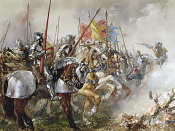A hero is one who acts in the best interests of the greater whole. According to the Oxford English dictionary, a hero is "a man who exhibits extraordinary bravery, firmness, fortitude, or greatness of soul, in any course of action, or in connexion with any pursuit, work, or enterprise; a man admired and venerated for his achievements and noble qualities." But given those qualities, does the quality of being a great rhetorician support a claim to heroism? The thought that one can use language, rather than the conventional brute strength exemplified by Hercules and Beowulf, to achieve a beneficial outcome can be supported by Henry's character in William Shakespeare's Henry V.
King Henry V assumes his role as king after the death of his father, Henry IV. Prior to ascending the throne, Harry, as his friends call him, was known for his debauchery. Harry was an immature prince, but as the King of England, he suddenly becomes mature and wise.
Henry's bishops convince him of his right and duty to acquire the throne of France. Soon, Britain is preparing for war and fully supporting their king in his pursuit of the French crown.
Henry's powerful words prove his ability to rouse his troops and frighten the enemy. Unlike more traditional heroes, Henry's heroism is not shown in battle, but rather before the battle. Because Henry is able to put fear into the enemy with his threatening messages, the opposing army may not fight as well as one might expect. As seen at Harfleur, the governor surrenders to save the lives of the citizens. It can then be assumed that Henry, along with saving the innocent lives of the townspeople, has saved the lives of some soldiers that would not have fared so well in battle had the governor...


